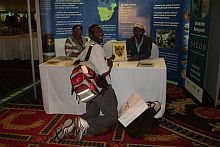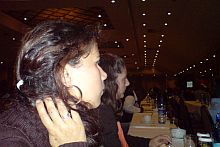SAEON reports on PhD Conference and Fair
|
South Africa currently graduates 27 PhDs per million of population compared to 42 in Brazil, 172 in South Korea, 240 in Australia and 259 in the UK – a performance well below par for an emergent economy.
The National Research Foundation (NRF) has launched the SA PhD Project to address this serious shortfall.
“The main aim of the SA PhD Project is to increase the diversity of, and strengthen the corporate and higher education sectors by increasing the number of PhD graduates,” said Dr Carol Nonkwelo, project manager.
In May 2009, the NRF hosted the PhD Project Conference in Johannesburg. An accompanying exhibition showcased the opportunities for study, financial support and research in South Africa and around the world. Among the countries from which exhibitors were drawn are Singapore, the United States, the Netherlands and Germany.
SAEON representatives Selelo Matimolane and Spokazi Manakele reports on the exhibition:
The exhibition was organised specifically for potential PhD candidates to interact with organisations ranging from funding agencies, science councils and universities to engineering and technology companies. The organisations showcased the opportunities available for research, training, support structures and funding for a wide variety of disciplines.
Exhibitors were exposed to about 300 potential PhD students from disciplines such as Law, Medicine, Ecology, Hydrology and Biotechnology. At the SAEON stand we made direct contact with about 100 students who visited the stand because they were genuinely interested in what we had to offer. The interaction included several questions about the logistics of registering a PhD at a university and doing the actual project work through SAEON.
The SAEON stand (which has a map of South Africa showing the geographical spread of the nodes) proved to be a major attraction for students as well as other exhibitors, particularly because the spread of the nodes demonstrated that SAEON is represented across the country. The visuals on the stand stimulated more questions about SAEON and its programmes.
Based on the feedback received, it seems as if several students are interested in pursuing participation in SAEON programmes.
Caren George, an intern at the SAEON Egagasini Node and one of the prospective PhD students who attended the Conference, gives her impressions:
The first day of the Conference was set out for registration, the Project Fair/ Opportunities Expo and the welcoming function.
The Project Fair/Opportunities Expo was both interesting and useful as it hosted local and international universities and research institutions. Students were able to gain useful information on the opportunities offered as well as the application procedures for the various research scholarships.
The international research programmes were very interesting, especially the DAAD (German Academic Exchange Program). One of the options available in the programme is known as a ‘sandwich program’, where a student carries out his/her research at a South African university as well as at an international university, spending up to a year abroad. This is definitely an option that merits further investigation, as the opportunity to study abroad would provide greater exposure to international research.
The second day consisted of talks by the organisers of the PhD conference as well as past and current PhD students. The organisers gave a detailed description of the PhD project, indicating that they were aiming to increase the number of PhDs five-fold by the year 2025. They emphasised how this project would increase the knowledge capital of the country and steer it towards a knowledge-based economy as opposed to a labour-based economy. Past PhD students described how they experienced their studies and what they found to be the most challenging aspects of the study.
The final day of the conference was dedicated to research opportunities in various disciplines. I found it disappointing that physical and biological oceanography was not covered. However, the presentations proved to be interesting, with strategies and ideas that could come in useful when applying for funding and scholarships.
The final session looked at the most important considerations when completing a thesis and was generally very helpful in guiding prospective PhD students in their approach to their studies.
Overall I found the conference to be highly educational. The information will undoubtedly prove useful in the planning and management of my PhD.












